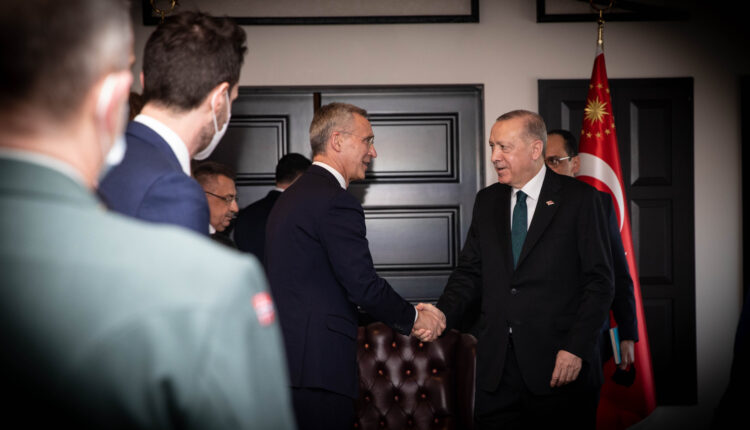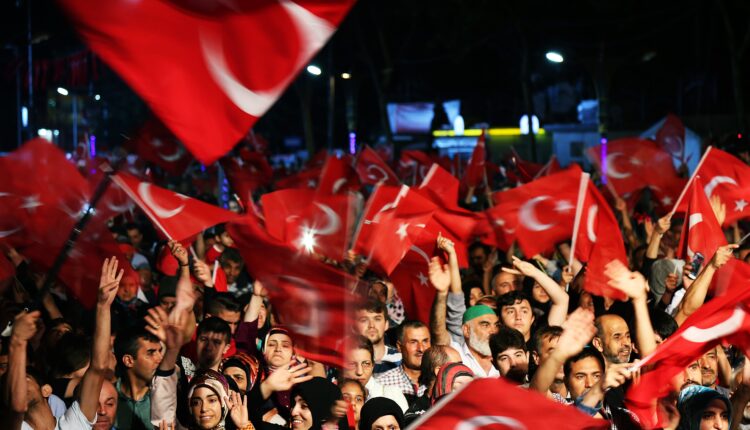Türkiye’s Unique Role in the Russo-Ukrainian War: Incentives for Brokering Peace
 President Erdoğan shares his aspirations for a peace deal in Istanbul. "Ukraine Under Attack" by Turkish Presidential Press Service is licensed under CC BY 2.0
President Erdoğan shares his aspirations for a peace deal in Istanbul. "Ukraine Under Attack" by Turkish Presidential Press Service is licensed under CC BY 2.0
With Russia’s invasion of Ukraine this past February, Türkiye could have been in a dangerous position, caught between two of its partners. Instead, Turkish President Recep Tayyip Erdoğan has capitalized on his country’s strategic geopolitical position, positioning Türkiye as a mediator in the conflict to improve its international standing. Seizing the opportunity to occupy a more significant role in the global arena, the Turkish government has initiated an attempt to bolster its image vis-à-vis the West and benefit from peace negotiations between Russia and Ukraine.
In the midst of a severe economic downturn, Turkish foreign policy has resurrected its ‘zero problems with neighbours‘ policy, attempting to create favourable relations with neighbouring countries and the rest of the world. This is demonstrated by the eagerness of the United Arab Emirates to improve ties with Erdoğan as a means to reap benefits from the Turkish recession despite years of tense relations. The severe devaluation of the lira makes Türkiye an attractive economic partner for countries that seek profits from inexpensive investments.
In recent years, Türkiye has been building up its economic and political relationship with Ukraine to strengthen its position in the Black Sea Basin. However, Russia has been a more valued economic and security partner, as Erdoğan depends heavily on Russian energy. Close economic ties with Russia help fuel the Turkish economy, as seen by the prevalence of Turkish companies that operate, as well as large Russian tourism companies that operate in Türkiye. Thus, sanctioning Russia would only exacerbate Türkiye’s economic condition. Since the Turkish recession began, Erdoğan and the AKP party have plummeted in the polls and lost control of the major cities of Istanbul and Ankara in the 2019 local elections. This has incentivized Erdoğan to seek out new ways to bolster his public image, including positioning himself on the world stage such that he is at the forefront of impactful policy decisions.
To improve his chance of re-election, Erdoğan is leveraging Türkiye’s strategic position as a transit corridor to get directly involved in peacekeeping efforts between Russia and Ukraine. Geographically, Türkiye’s participation is essential for the movement of key resources between Europe and the rest of the world. Capitalizing on its geopolitical position, Erdoğan helped broker the landmark grain deal between Russia and Ukraine in July, which unlocked food and grain exports from both countries for the first time since the start of the war. Notably, this deal has helped avert global food insecurity by continuing to facilitate the transportation of Ukrainian grain to world markets. Türkiye’s ability to broker the grain deal signals its competence as a mediator and importance as an international actor.

In addition to the grain deal, Türkiye also has a say in the activity of military vessels. As a NATO member with friendly relations with both sides, Türkiye is in a unique position to ensure the safe passage of ships through the Black Sea and Bosphorus. The 1936 Montreux Convention granted Türkiye the ability to limit certain military vessels from transiting the Turkish straits during wartime. Nevertheless, Türkiye is yet to put this policy to use. While Ukraine has appealed to Türkiye to use this clause to block the passage of Russian warships, Türkiye has refused on the account that it cannot stop this due to a clause in an International pact.
According to the Convention, unless Türkiye is directly threatened by the nation it sanctions, the sanctioned country retains the right to return ships to their home base. In this case, since Russia does not directly threaten Türkiye, Russian warships would retain the right to return to their home bases on the Black Sea. Therefore, if Türkiye agreed to close the straits to Russian warships, the ships would only be prevented from travelling in one direction, away from their home base. However, if Türkiye were to become directly involved in the war, positioning itself against Russia, it could – legally, at least – deny all movement of Russian warships through its straits. Türkiye’s unwillingness to enact this clause of the Montreux convention reiterates the country’s reluctance to antagonize Russia.
From another angle, Türkiye has a special connection to the Ukrainian effort, given its ethnic ties to the Crimean Tatar community. While Türkiye has continued selling weapons to Ukraine, they have refused to join anti-Russian sanctions, which has drawn ire from the Ukrainian public. While this may seem detrimental for Türkiye, Erdoğan is attempting to assert Turkish self-sufficiency on the global stage by contradicting the expected Western response to Russian aggression and carving a more independent geopolitical position for Türkiye.
Unlike other NATO countries, Türkiye has positioned itself firmly against sanctions, pursuing a strategy of “multifaceted connectivity” through negotiation, stating that “the war will end at the negotiating table.” In March, the first high-level talks since the beginning of the conflict were organized by the Turkish foreign ministry, including a trilateral meeting between the Ukrainian, Russian, and Turkish foreign ministries. Türkiye has brokered multiple peace talks since inaugurating the Istanbul Joint-Coordination Center to allow for the safe export of products from Ukrainian ports. While Türkiye has faced some challenges, including failed attempts at negotiating a broader peace agreement, Erdoğan has been quite successful in positioning Türkiye as a benevolent, neutral negotiator in the conflict, improving Türkiye’s standing on the global stage.
In previous years, Türkiye has been cast aside in the international arena, with important players like President Joe Biden refusing to talk to Erdoğan at major summits. Its numerous failed attempts to join the EU since 2005 have further ostracized Türkiye. We are now seeing a marked shift as Türkiye’s international standing has been bolstered following the Russian invasion of Ukraine, receiving international praise for their participation in brokering the grain deal.
In what critics have called a device to divert from the country’s economic turndown, Erdoğan has also recently changed the official name of Türkiye from the original “Turkey” and asked the international community to respect the proper pronunciation “tur-key-yay.” This is widely seen as an appeal to nationalist voters within Türkiye as well as a way to promote Turkish nationalism on the international stage.

In effect, Türkiye is interested in brokering peace between the warring countries for the sake of peace itself. If Russia were to invade a NATO country, Türkiye would be obliged through Article 5 of the NATO treaty to take up arms against Russia, which would be detrimental to Türkiye on account of the economic and political ties between the two countries.
To deflect from his weakness within Türkiye and bolster his international standing, Erdoğan has been pursuing a relatively successful campaign of mediating negotiations throughout the Russo-Ukrainian war. With economic, social and political ties to Russia and Ukraine, Türkiye has emerged as a major swing player throughout this war and is set to remain a key player in brokering the end of the conflict.
Featured Image: “President of Ukraine Volodymyr Zelenskyi, President of the Republic of Turkey Recep Tayyip Erdogan and UN Secretary-General António Guterres during a tripartite meeting in Lviv” is licensed under CC BY 4.0
Edited by Derya Ekin
